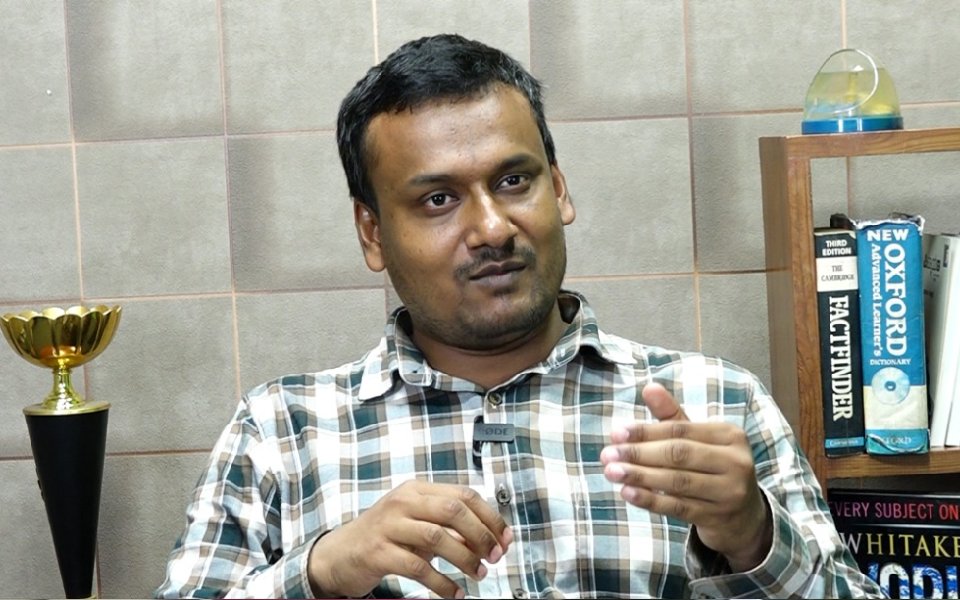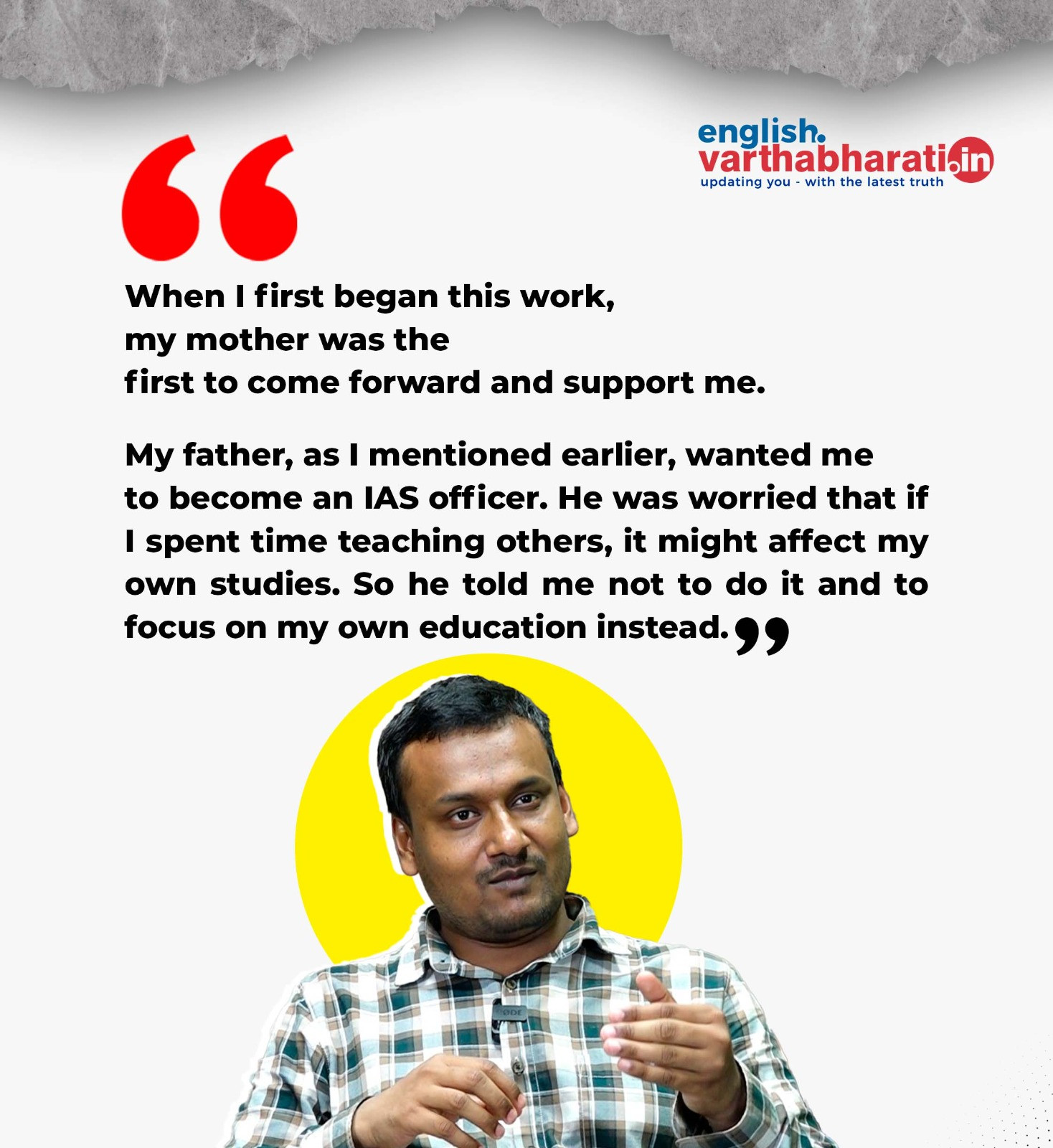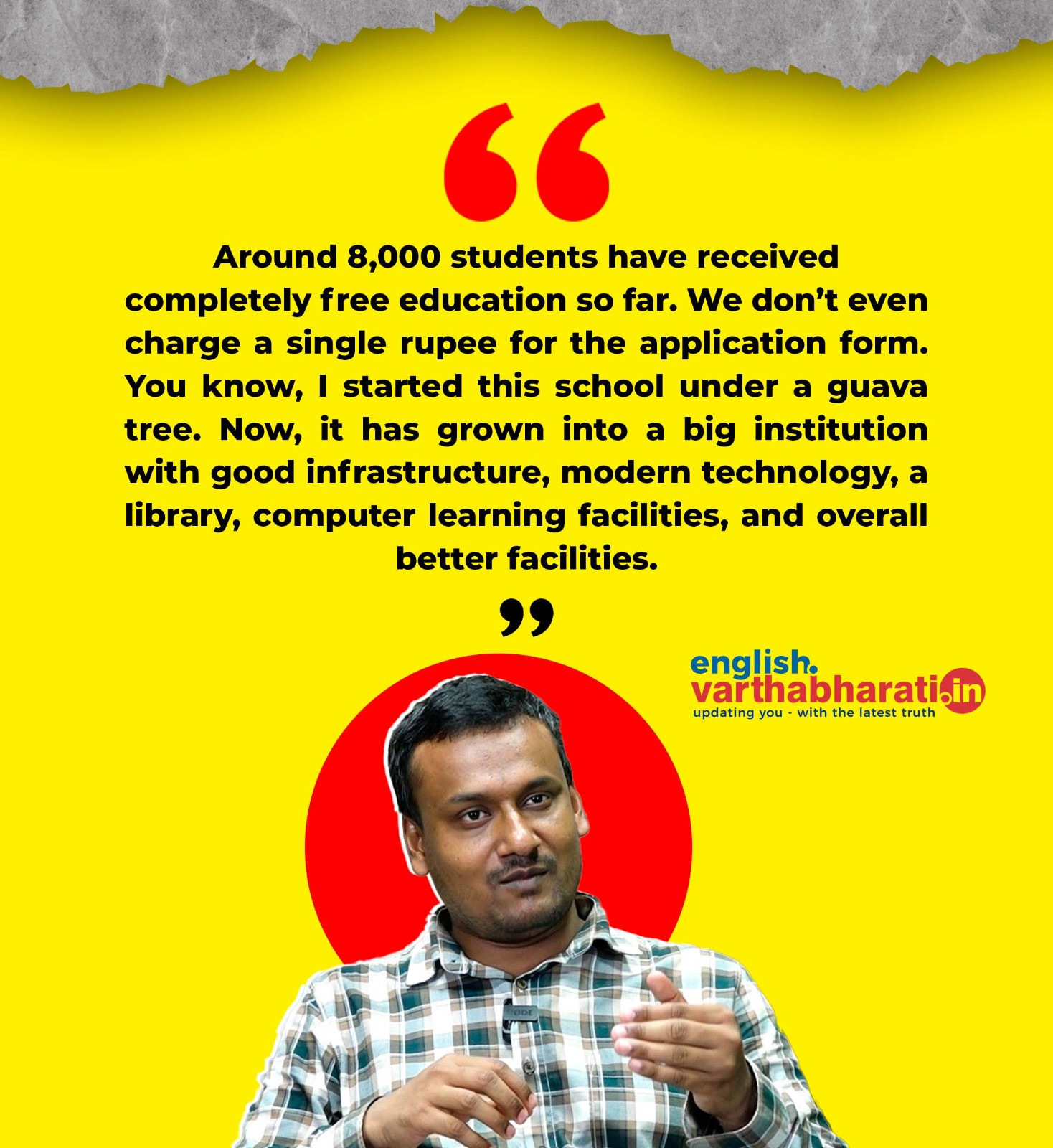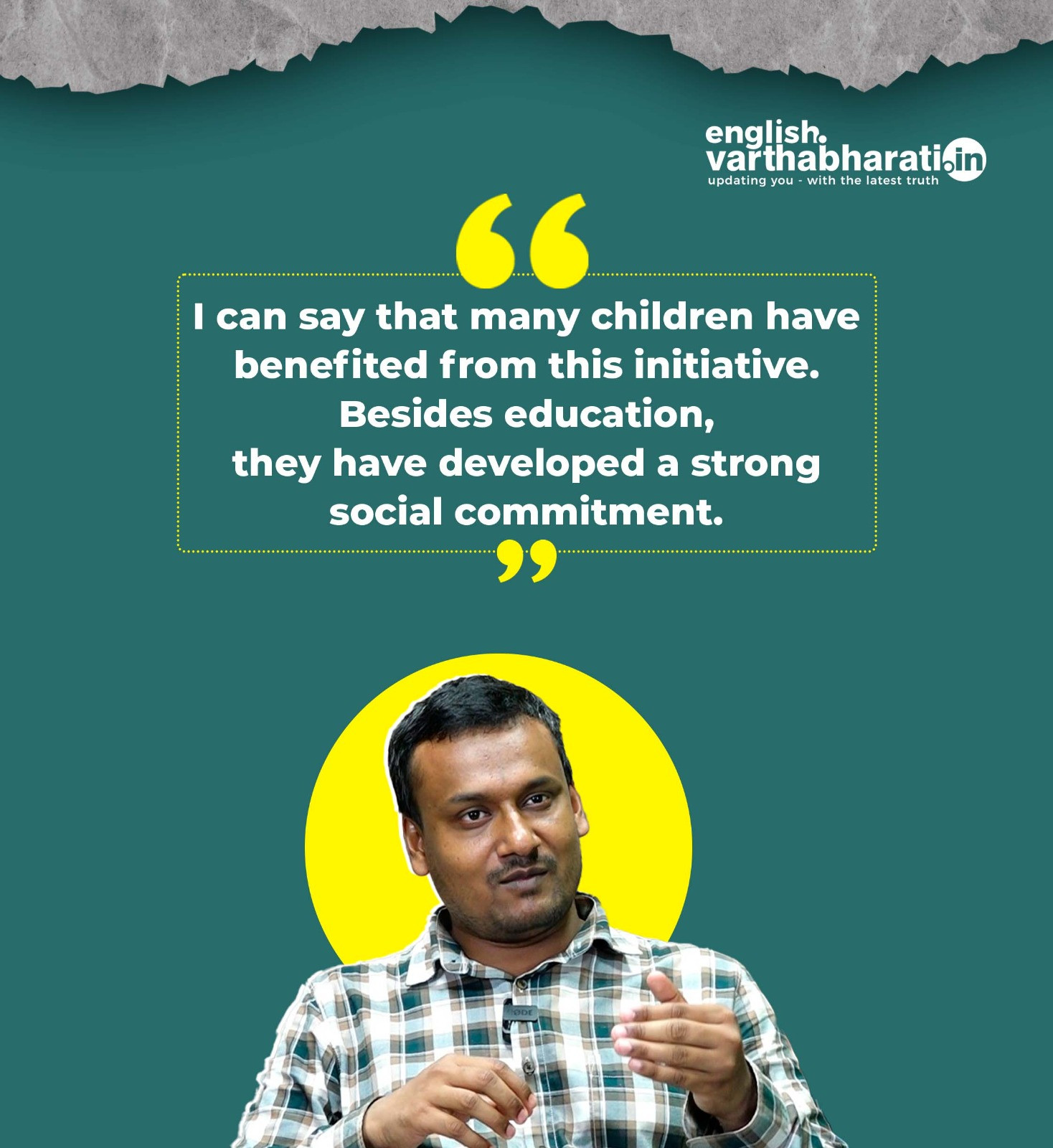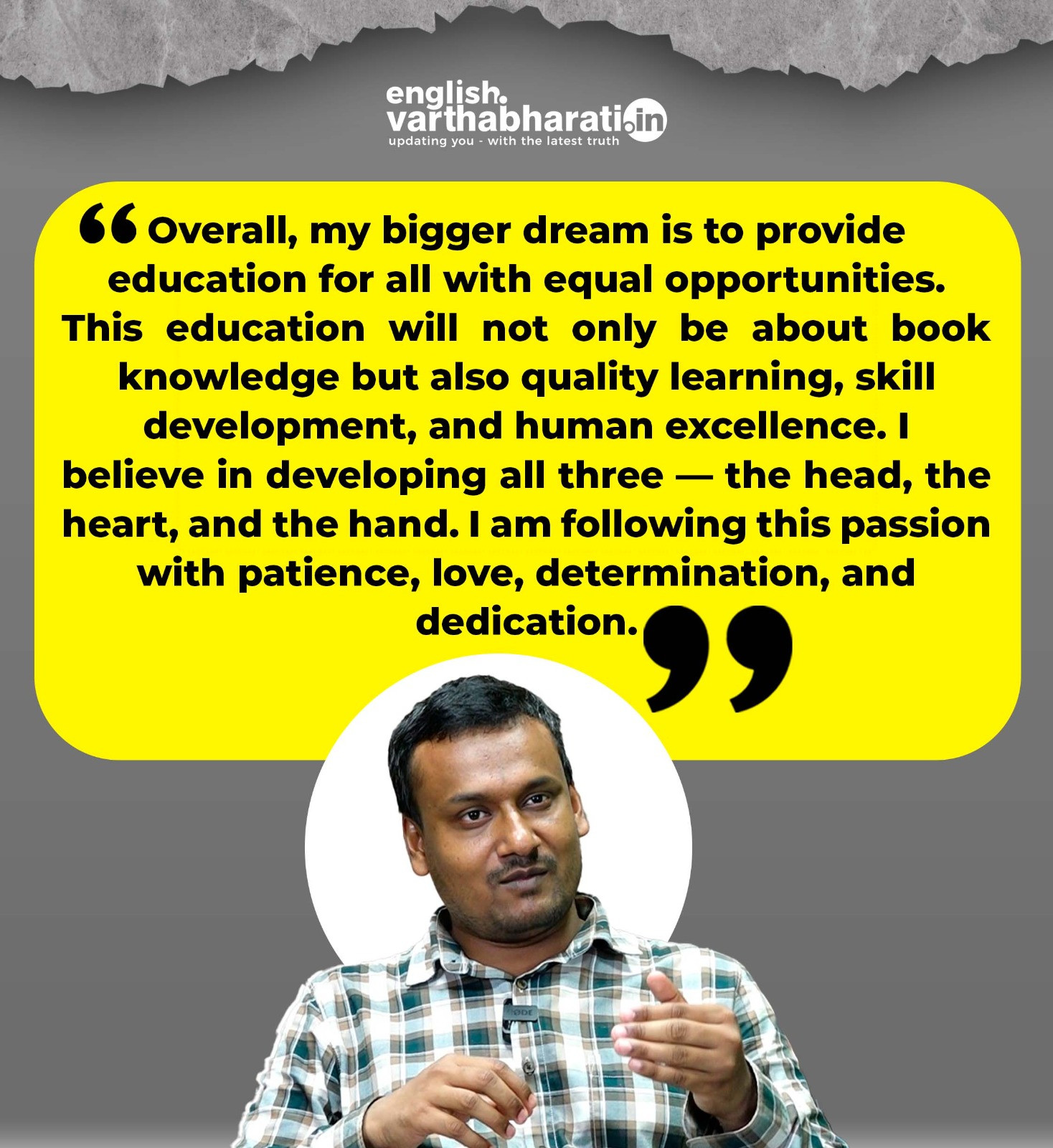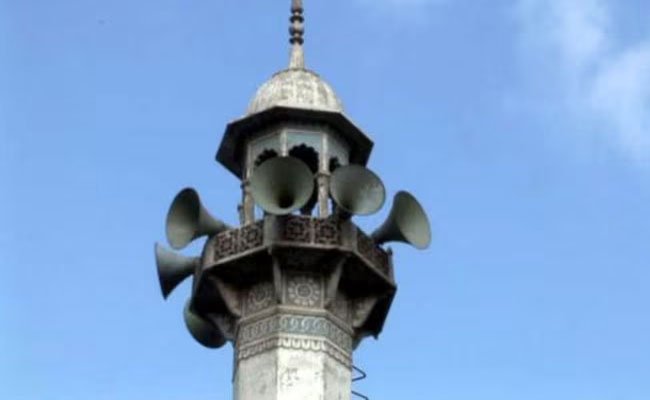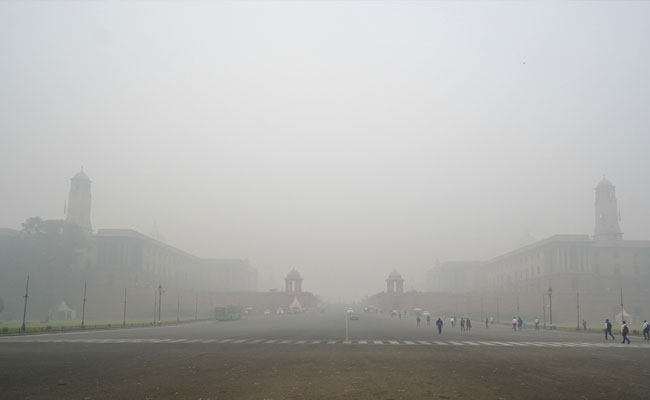Babar Ali began an extraordinary journey in education at the tender age of just nine years. What started as a small effort to teach children under a guava tree has grown into a well-established school, Anando Shiksha Niketan, which offers completely free education to hundreds of students every year. Over the past 22 years, Babar Ali has dedicated himself to providing quality education without any fees, helping thousands of children—especially from marginalized communities - build a better future.
His school, recognized by the West Bengal Board of Secondary Education, provides education up to the 10th standard and combines modern facilities like computer learning and a library with strong values and skill-based training. Babar Ali’s work has earned him wide recognition, including international awards, a place in school curricula worldwide, and titles such as TED Fellow and Forbes 30 Under 30.
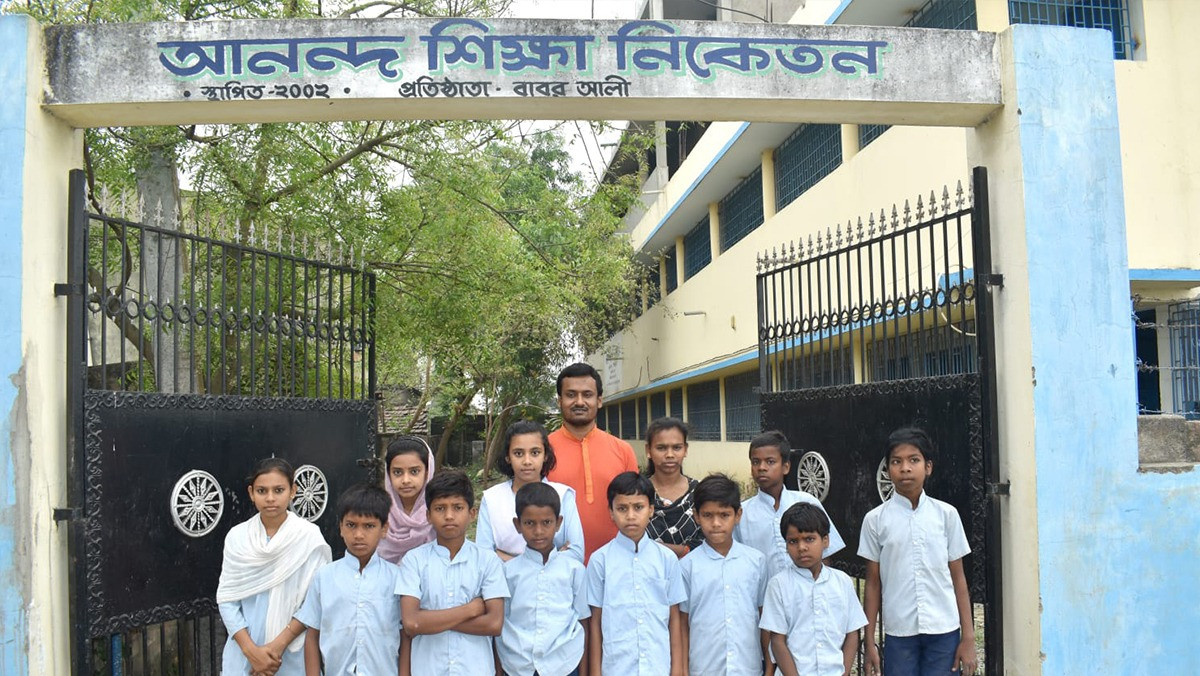
Babar Ali posing with his students at Ananda Shiksha Niketan Campus
In this interview with Vartha Bharati, Babar Ali opens up about his journey, the real impact of his school, his future vision, and advice for students today. Here are some excerpts from our conversation.
Question: Why did you start a school at the age of 9? What was the reason behind it?
As you may know, I am from Murshidabad district in West Bengal. Our district is about 200 kilometres away from Kolkata, the state capital. Murshidabad was once the capital of Bengal, Bihar, and Odisha—a place rich in history. But today, it is one of the most backward districts in the state.
My father, Mohammad Nasiruddin, was a school dropout. But he had a deep interest in education. He enrolled me in a school that was 10 kilometres away from our village.
However, in my village, I saw children my age who could not go to school. Most of them were working - boys were grazing cattle or working in shops, and girls were doing household chores. Their parents made them work to earn money for the family.
I was in Class 5 and just 9 years old when two strong feelings came to my heart - love and realization. The love was my love for teaching. I wanted to share what I was learning in school with those who couldn’t go to school. The realization was that I too came from a very modest background, but my father believed in giving me proper education. That made me think: if I’m getting an opportunity to study, why not help others too?
These two thoughts pushed me to start my small initiative under a guava tree in our backyard. I called it Anando Shikha Niketan, which means “Home of Joyful Learning” in English. That was the beginning - and over the years, it gradually became a full fledged school.
Every time I got promoted to a new class in my own school, I added a new class in my school as well. Slowly, it grew into a big institution. So yes, it all started from the heart - love and realization helped me begin this mission.
Question: But you were only 9 years old, a very young age. At that time, children usually think of playing and enjoying life. What made you think of starting a school? Was there any special motivation behind it?
To be honest, there was no external motivation. Nobody told me to do this. As you rightly said, children at that age are usually busy playing—but for me, teaching others felt like play. Every afternoon, I would come back from my school and share whatever I had learned that day with other children.
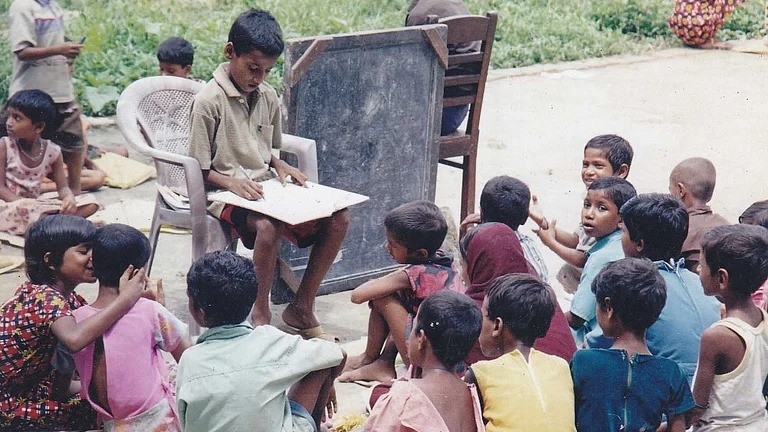
A photo of nine-year-old Babar Ali teaching his students
I used to collect small broken pieces of chalk from my teachers. One of my teachers Baijayanti Tewari got curious and asked my friend why I needed broken chalk every day. My friend told her, “No madam, he’s not using it in school - he’s using them to teach other children. The Baijanti Tewari gave me a full box of chalks, that encouraged me.”
There were no proper books either - we didn’t have money. But my parents came forward to support me, even though they didn’t know how to read or write in Bengali or English themselves.
To raise money for books, I first collected rice from the houses of the children who came to my class. Then we sold that rice at a local grocery shop and got 20 rupees. With that money, we bought 20 Bengali alphabet books and distributed them to our students.
So yes, for me, it was all about the joy of learning and the love for teaching. Nobody asked me to do it. It all came from within.
Question: What was the initial response from the children and their parents?
The response was mixed. Some students and a few parents were happy and excited. The students, especially those who were my age or younger, were glad to be learning something.
But convincing the parents was not easy. Many parents would ask, “What is the use of education when we can’t even manage two proper meals a day? What will our children gain from studying?”
So yes, I faced negativity and discouragement. But once again, I say this -love and patience helped me. With time, I was able to convince both the students and their parents.
Question: How many students did you start with?
I began with 8 students. One of them was my own sister, Amina Khatun. She was the first student of our school.
Question: Tell us about your family background
We are a family of six — my parents, my sister who recently got married, my two younger brothers, and me. We come from a very modest background.
My father works as a jute seller. Even today, he continues to run a small jute business. Since jute is one of the major crops grown in Bengal, it was a natural source of livelihood for us.
Both my parents are school dropouts. They barely studied till class 8. But despite that, my father has always had a deep interest in education. He dreamed of seeing me become an IAS officer. Right from my childhood, he made sure I studied in a good school, even if it was 10 kilometres away from our home.
So that’s the kind of background I come from - very simple, but filled with dreams and determination.
Question: What were the challenges or problems you faced when you started this school?
That’s a very good question. When I first began this work, my mother was the first to come forward and support me.
My father, as I mentioned earlier, wanted me to become an IAS officer. He was worried that if I spent time teaching others, it might affect my own studies. So he told me not to do it and to focus on my own education instead.
But I continued with what I was doing. One day, my father discussed this with a retired college principal who was a close family friend - someone known to us since my grandfather’s time. My father asked him what he should do about my involvement in this work.
The principal gave him two reasons to support me. First, he said that if I was doing something good for society, God would definitely help me. Second, he said that sharing knowledge would only help me learn better. These words changed my father’s mind. So convincing him was the first challenge I overcame.
Thankfully, I have always had my family’s support since childhood. But it wasn’t easy to convince others - especially the students, their parents, and society at large. Unlike a place like Mangalore where education is well established and people are aware, in our region it was difficult to make people understand the importance of education.
I also didn’t have enough resources to provide students with books or stationery. After all, I was just a child myself trying to do all this.
Many people discouraged me. And as I grew older, I had to face jealousy and negativity from my surroundings. Those were my early challenges. Over time, the nature of the challenges changed, but they never stopped. However, there were also kind-hearted people who noticed that a teenager was trying to do something meaningful for society. They supported me too.
Question: I read somewhere that you had to take security also. What was that about?
Yes, that’s true. Sometimes, when people don’t understand your work - or when your efforts start getting noticed and you become known — some members of society, especially those who are ignorant, start creating problems.
This happened when I was still a teenager. Back then, the Chief Minister of West Bengal was Hon’ble Sri Buddhadeb Bhattacharjee. I met him soon after my SSLC examination. His government later extended moral support to me.
You see, every society has people with different mindsets. Whenever I faced such threats or problems, there were also people - including the government - who stepped forward to protect and support the good work I was trying to do.
Question: What kind of support did you receive and from whom, to run this school?
First of all, I got support from my parents and family.
Then, I shared an example about broken chalk. My teacher, Madam Boijonto Tiwari, who was the seniormost teacher, once noticed that my students were using broken pieces of chalk to teach others. I was in Class 6 at that time. She immediately came forward and gave a full box of chalk. That small gesture gave me a lot of encouragement. Later, she and another teacher informed the local media and a leading Bengali newspaper about my work.
As a result, people started noticing. When I was in Class 8, Nobel laureate Amartya Sen invited me. Around the same time, my father introduced me to some government offices.
One day, I went to our village panchayat office with an application requesting books. The panchayat pradhan was very happy to see my initiative, but she didn’t have any books in stock. She recommended my application and advised me to approach the Block Development Officer.I went to meet him, but unfortunately, he did not provide the books.
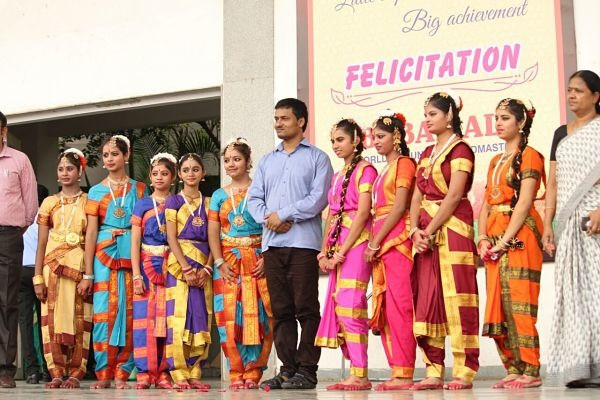
Then I decided to go to the District Magistrate’s office, the Deputy Commissioner. Wearing my school uniform and carrying my school bag, I submitted a slip with my name, Babar Ali, headmaster of Ananda Shiksha Niketan, along with some newspaper clippings where the school was featured. The officer assumed I was an elderly headmaster and had great respect for teachers.
He told his peon to call the headmaster in first. When I entered his chamber, he was surprised and said, "I had called the headmaster, who is this boy?" With folded hands, I said, "Sir, I am the right person. I am a student in the morning and run this initiative in the afternoon." He was quite impressed.
The very next day, he sent the Sub-Divisional Magistrate for a surprise visit to verify if my story was genuine. The SDM, Shobuj Varun Sarkar, came and was very happy. From then on, the District Magistrate, Mr Jeevan Krishna Sadhukhan, supported me wholeheartedly. He helped both me and the institution till his last breath.
The SDM even became the first president of our school managing committee. I was in Class 8 and he was the president, because I had learnt that every institution needs a managing committee.
Another example I want to share is about the Ramakrishna Mission, which is about 3 km from our house. I approached them for support after learning about their philanthropic work. Even during my primary school days, they had helped us with uniforms and other things. Later, they invited me for their National Youth Day celebration.
I attended the event with my students. The principal of a government girls' higher secondary school, Madam Firoza Begum, was also there with her students. During the function, Swamiji introduced me to the audience as a boy who was doing such work in our area. After the event, Madam Firoza Begum came to me with a motherly concern and asked how she could support me.
After a few days, I visited her institution and requested her to become the secretary of our school. She accepted. Even today, for the last 18 years, she continues to serve as the secretary. She has been an MLA multiple times in the West Bengal Legislative Assembly and is also a principal.
So, as you can see, many kind-hearted people came forward to support me.
The media also played a huge role in my journey. Local, state, national, and eventually international media started covering my story. After my SSLC exams, when Chief Minister Buddhadev Bhattacharya felicitated me, around 100 journalists had gathered. That day, the news spread widely.
I did face many challenges too, that is true. But at the same time, kind people - individuals, Ramakrishna Mission, district administration, and my own parents - all came forward to support me. And now, even philanthropic organisations and media are helping us. That is why it has been possible to offer completely free education from the beginning till now.
Question: What is the current status of the school? Up to which standard do you provide education? How many students and teachers are there?
I have completed 22 years of this journey. On 19th October 2024, it marked the 22nd anniversary.
Around 8,000 students have received completely free education so far. We don’t even charge a single rupee for the application form. You know, I started this school under a guava tree. Now, it has grown into a big institution with good infrastructure, modern technology, a library, computer learning facilities, and overall better facilities.
You will be happy to know that much of the initial support, especially for building construction, came from Karnataka itself. An engineer named Sriram Sir visited Murshidabad about 20 times and still helps us. One of my mentors, Almitra H. Patel, was the first person from Bengaluru who took the initiative to start the construction.
The construction is very strong. We got permission to build G plus 2 floors, but the building can support up to G plus 5 floors.
Our school is now recognized by the West Bengal Board of Secondary Education under the Right to Education Act. As I told you earlier, the education here is completely free. According to the Right to Education Act rules and reservations, we have the capacity to educate about 500 students.
Question: Up to 10th standard?
Yes, till secondary level.
Question: How was your own education? What did you study and how did you complete it?
As I mentioned earlier, throughout my school days, I got promoted to the next class every year. I kept adding one class every year in our school as well. In 2013, I completed my graduation in English Honours.
In 2015, I completed my Master of Arts in English Literature. Then in 2017, I completed another Master of Arts degree in History, along with a teacher’s training degree. So, I did a double post-graduation and also a teacher’s training course.
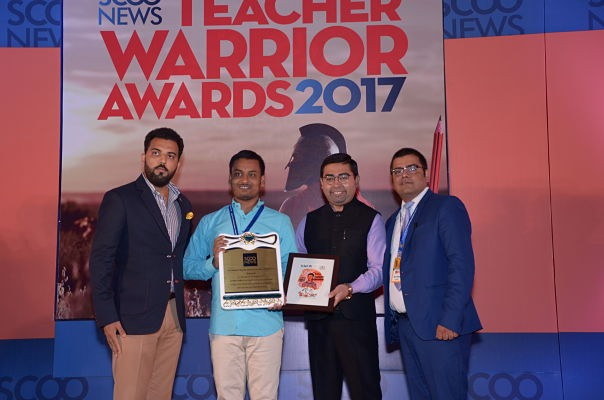
Question: What do you think is the real impact of your school? Beyond giving education to students, what overall change have you seen?
The first challenge was to bring children into education, and then to keep them motivated and hold their interest.
Even in a city like Mangalore, there are many migrant labourers from Bengal. After a certain age, many children stop going to school.
Especially girls’ education was very poor at that time. To be honest, many students couldn’t even score one mark when they joined Ananda Shiksha Niketan. But with joyful learning, love, and dedication, we prepare them to become real human beings.
The first and most important impact is that education is not just book knowledge or information, but it is about building good human beings.
Six of our former students, especially girls, after completing graduation, post-graduation, and teacher training, have returned to become teachers here.
Many students are pursuing higher education now. Unfortunately, in our state, employability is a big problem these days.
I can say that many children have benefited from this initiative. Besides education, they have developed a strong social commitment.
I am proud to say these two things came from our institution. Also, many like-minded people and young generations have been inspired by our work and are trying to start similar initiatives in different parts of India.
Question: How many teachers are there in your school? Are students from all communities included?
Yes, definitely. Our school is open to all, and we follow inclusive education. Currently, we have 10 regular teachers and 10 guest teachers.
Question: What are your future plans for the school?
My dream for Ananda Shiksha Niketan is to develop it into a higher educational institution. Nowadays, there are many schools and colleges everywhere, but what is missing is value-based education and human excellence. Many students in areas like ours stop their education early and end up as migrant labour or searching for jobs without proper skills. So, we plan to introduce a skill-based learning centre.
Overall, my bigger dream is to provide education for all with equal opportunities. This education will not only be about book knowledge but also quality learning, skill development, and human excellence. I believe in developing all three - the head, the heart, and the hand. I am following this passion with patience, love, determination, and dedication.
Question: Since you provide free education, do you face any competition or problems from other institutions that charge fees?
Yes, problems do exist - sometimes visible, sometimes invisible. Even in an advanced state like yours, there are many private institutions. But in our area, there are very few private schools. So, yes, competition is everywhere.
But more than competition, the biggest challenge is jealousy. It’s not always from other institutions but from people who get jealous of this achievement. Despite that, I have strong determination and good support, like yours. With these, I keep following my passion and commitment.
Question: You have gained a lot of fame for your work. Could you please share some of the national and international recognition you have received?
Recognition always makes us happy, but more than that, I believe it brings more responsibility. Sometimes achieving something is easy, but maintaining that achievement is harder. I am happy with all my achievements and the responsibility that comes with them.
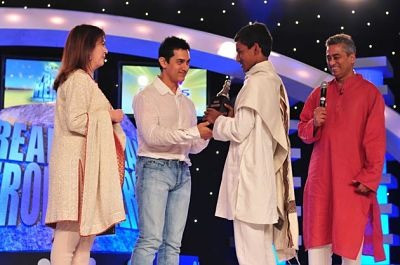
Babar Ali receiving award from Bollywood superstar Aamir Khan
Since childhood, I have received recognition, especially from media like you, and many national and international awards. My story is now part of the syllabus in different boards — in Karnataka state, CBSE, ICSE, and other states. Even students from countries like the US, Canada, Turkey, Luxembourg, and Morocco write to me asking how I achieved this starting at age nine. That shows the impact.
I am a TED Fellow, listed in Forbes 30 Under 30, and I have been recognized by media like NDTV, CNN IBN, Indian of the Year, Real Heroes Award, Education Leadership Award, and many others. BBC named me the Youngest Headmaster in the World. I have also visited 14 countries for my work.
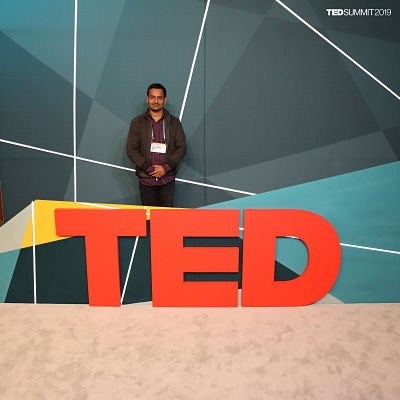
Question: We heard there was a Hollywood biopic offer on your life, and Angelina Jolie was interested. Could you tell us about that?
Yes. Amnesty International and Angelina Jolie published a book called 'Know Your Rights and Claim Them'. They featured three stories from the education sector worldwide - Malala, myself, and one other person.
Question: You have said Swami Vivekananda is your role model. What have you learned from him?
Yes, when I visited the local Ramakrishna Mission, Swami Vivekananda’s teachings inspired me a lot. He gave me a book with a quotation: "Service to man is service to God." Whenever I work for humanity, I remember this message. It motivates me a lot. Our Prophet also said many important things, like how for education, you should even travel to China.
For girls’ education and everything else, the most important thing is to realize and apply these teachings in our life. Swami Vivekananda’s messages gave me a lot of encouragement to work for mankind and keep moving forward.
Question: What is your suggestion to youngsters and students?
Yes, for students, based on my experience, I would say use your time well and live a disciplined life. That is the most important thing.
Secondly, though it may sound philosophical, it is true for life — whenever you have a passion, follow it with patience, love, determination, and dedication. The most important thing is to believe in yourself. All the power is inside you. If you believe in yourself, you can achieve anything in life.
Also, be good and do good. These are the life principles I follow and want to share. But for students especially, proper use of time and discipline are the key.
Question: Since you have become famous, do you plan to enter politics?
No, I don’t have any plans to enter politics. Many good people have suggested that this is my path to promote education and related work.
What will happen in the future, I don’t know. But right now, I am just following my passion - education for all, with equal opportunity, and with support from people like you.
Question: Do you plan to open more schools in West Bengal or other parts of India?
Yes, not just in West Bengal but in many parts of the country.
Many like-minded people have been inspired by this story and want to work with me. I am only one person - Babar Ali - but together, we can do more. So I continue to follow my passion.
For example, I am here in Mangalore not to gain name or fame. My goal is to inspire one more Babar Ali, to bring more like-minded people forward. That is my intention.
At the end of our conversation, Babar Ali warmly shared his vision for the future -continuing to spread free, value-based education and inspiring many more young changemakers across India. He thanked everyone supporting his mission and expressed his hope that together, they can create equal opportunities for all children. With deep passion and unwavering dedication, Babar Ali signed off, committed to carrying forward his dream of education for every child.
Let the Truth be known. If you read VB and like VB, please be a VB Supporter and Help us deliver the Truth to one and all.
Jamshedpur (PTI): One person was arrested on the charge of raping a 30-year-old woman with speech impairment in Jamshedpur, a police officer said on Tuesday.
The incident occurred in the Azadnagar police station area of the city, and a case in this regard was registered based on the statement of the victim's brother on Monday.
The victim had gone to fetch water from the premises of a company on Monday evening. When she did not return even after a considerable time, family members went out in search of her and caught the accused red-handed, police said.
ALSO READ: BJP accuses Karnataka govt of 'failing' to prevent noise pollution caused by 'azaan'
The accused was a caretaker of the company.
Deputy Superintendent of Police (Patamda) Bachandeo Kujjur said due to scarcity of water in the area, the victim used to fetch water from the premises of the company.

